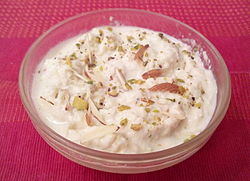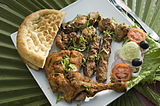Rabri
This article includes a list of general references, but it lacks sufficient corresponding inline citations. (March 2013) |
 | |
| Alternative names | Rabdi |
|---|---|
| Region or state | Indian subcontinent |
| Associated cuisine | India, Pakistan, Bangladesh |
| Main ingredients | Milk and Pearl Millet Flour |
Rabri (IAST: Rabaḍī) is a sweet, condensed-milk-based dish, originating from the Indian subcontinent, made by boiling milk on low heat for a long time until it becomes dense and changes its colour to off-white or pale yellow. Jaggery, spices, and nuts are added to it to give it flavor. It is chilled and served as dessert. Rabri is the main ingredient in several desserts, such as rasabali, chhena kheeri, and khira sagara.
A similar dish goes by the name Basundi.

History
Chandimangala mentions rabdi (thickened, sweetened milk), along with other sweets in the early 1400s.[1]
Rabri was banned in Kolkata 1965 during an economic recession for its excessive use of milk. It was overturned within the year by the Calcutta High Court due to lawsuits from independent sweet shops.[2][better source needed]
Creation
Rabri is made by heating sweetened milk in a large open vessel (kadhai). As the layer of cream begins to form on the surface of the milk, it is taken off and kept aside. The process continues until the milk is exhausted.
See also
References
- ^ "Full text of "Indian Food Tradition A Historical Companion Achaya K. T."". archive.org. Retrieved 30 January 2019.
- ^ "The Bitterest Ban: The improbable story of how Bengal tried to ban Bengali sweets". Economic Times Blog. 25 July 2015. Retrieved 7 February 2020.




